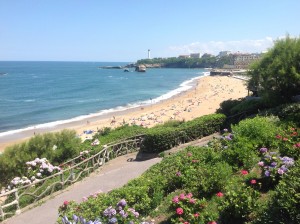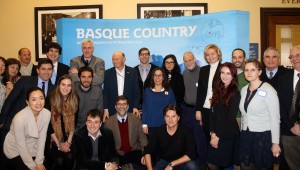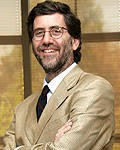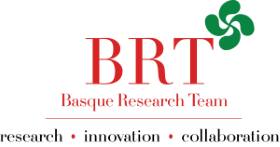by Borislava Manojlovic | Sep 23, 2015 | Blog |
 Traveling from the cool and cloudy Bilbao towards the sweltering heat of Barcelona, I feel a tinge of regret for the unseen, undiscovered, of inability to savor all the wonders of one place in a short period of time. In my mind’s eye, people and places I visited in the Basque country become alive.
Traveling from the cool and cloudy Bilbao towards the sweltering heat of Barcelona, I feel a tinge of regret for the unseen, undiscovered, of inability to savor all the wonders of one place in a short period of time. In my mind’s eye, people and places I visited in the Basque country become alive.
My travels first took me to sun-bathed Biarritz where easiness and quiet elegance, uninterrupted by the hassles of a big city, is a way of life. Then, to the picturesque neighboring villages of Saint Jean de Luz and Zokoa where the French Basque Coast has greeted me with a sharp contrast of blue Atlantic water, white houses and green hills so vividly colliding in a brilliant dance. In a conversation with a priest from Zokoa, Father Mikel, I heard a story of a tree representing Basque people for the first time. With a tear in his eye, Mikel talked about a perpetual struggle for dignity, the beauty of Basque language and its connection to the soul of the people and nature, ending his story with a simple statement: “Don’t cut the tree.”
(more…)
by Borislava Manojlovic | Mar 25, 2015 | About, events |
 On March 6th, 2015, the Advanced Consortium on Cooperation, Conflict, and Complexity (AC4) at Columbia University came together with the Agirre Lehendakaria Center (ALC) and our collaborators to host a public seminar at Columbia University. For several years, AC4, ALC, and our partners at Seton Hall University, George Washington University, and Scensei LLC have been engaged in an investigation of the Basque Case of Sustainable Human Development from different disciplinary perspectives. By conducting rigorous, innovative research, we hope to refine and expand upon lessons from the Basque experience that can provide guidance to other societies pursuing sustainable human development (SHD).
On March 6th, 2015, the Advanced Consortium on Cooperation, Conflict, and Complexity (AC4) at Columbia University came together with the Agirre Lehendakaria Center (ALC) and our collaborators to host a public seminar at Columbia University. For several years, AC4, ALC, and our partners at Seton Hall University, George Washington University, and Scensei LLC have been engaged in an investigation of the Basque Case of Sustainable Human Development from different disciplinary perspectives. By conducting rigorous, innovative research, we hope to refine and expand upon lessons from the Basque experience that can provide guidance to other societies pursuing sustainable human development (SHD).
Titled “Models of Sustainable Human Development: Lessons from the Basque Case”, the seminar allowed the project team to share the latest advancements in our research on aspects of SHD, while inviting others to engage with our work as it progresses. We were pleased to welcome attendees from the Basque Country, the Columbia University community, and other organizations, who offered a variety of valuable perspectives, thoughtful questions, and new ideas.
The seminar included updates on projects as diverse as mapping and analyzing narratives of the Basque peace process (Dr. Armando Geller, Scensei LLC), applying a Lonergan economic model to the Basque economy (Dr. Paul Hoyt-O’Connor, George Washington University), empirically modeling the connection between institutional characteristics and the pursuit of SHD (Dr. Josh Fisher and Kristen Rucki, AC4, Columbia University), and building narratives of transformation in Northern Ireland (Gorka Espiau, ALC). New endeavors were shared, including the creation of the Basque Research Team at Seton Hall University (Dr. Andrea Bartoli and Dr. Borislava Manojlovic, Seton Hall University) and the Sustainable Peace Systems Mapping Initiative at Columbia University (Dr. Peter Coleman and Kyong Mazzaro, AC4). Dr. Andrea Bartoli and Dr. Borislava Manojlovic also introduced several exciting new proposals for future research.
by Borislava Manojlovic | Mar 24, 2015 | Research Team |
 Anna Guryanova is a BS/MA student at School of Diplomacy and International Relations, Seton Hall University. She has specific interests in economic development and foreign policy. Currently doing research on the economic aspect of ethnic and religious conflicts, and energy politics of oil abundant economies. Anna’s interest in the Basque Research project is a result of research on the unique history of Basque region and current role of the Basque community in Spain.
Anna Guryanova is a BS/MA student at School of Diplomacy and International Relations, Seton Hall University. She has specific interests in economic development and foreign policy. Currently doing research on the economic aspect of ethnic and religious conflicts, and energy politics of oil abundant economies. Anna’s interest in the Basque Research project is a result of research on the unique history of Basque region and current role of the Basque community in Spain.
by Borislava Manojlovic | Feb 27, 2015 | Research Team |
 Emily Green is an undergraduate student at Seton Hall University’s School of Diplomacy and International Relations. She is currently pursuing a degree in both International Relations and Economics. Her passions include women’s rights, economic empowerment, and the post-conflict peace process. After working as Dr. Manojlovic’s research assistant for several months, she was approached to join the newly-formed Basque research team. She looks forward to gaining more insight on the impact of memory and forgiveness in the Basque peace process.
Emily Green is an undergraduate student at Seton Hall University’s School of Diplomacy and International Relations. She is currently pursuing a degree in both International Relations and Economics. Her passions include women’s rights, economic empowerment, and the post-conflict peace process. After working as Dr. Manojlovic’s research assistant for several months, she was approached to join the newly-formed Basque research team. She looks forward to gaining more insight on the impact of memory and forgiveness in the Basque peace process.
Originally from Phoenix, Arizona, Emily spends much of her free time attending lectures and events in nearby NYC. She is currently interning with the Permanent Mission of Malta to the United Nations, where she covers meetings and briefings on social and economic issues. She is excited to begin her senior thesis project next semester on the role of women in the mediation and post-conflict peace process.
by Borislava Manojlovic | Feb 24, 2015 | Research Team |
 Andrea Bartoli serves as a senior fellow at the Agirre Center. He is an international conflict resolution expert who has served in key academic and diplomatic positions for more than two decades. Dr. Bartoli served as the dean of the School of Diplomacy and International Relations at Seton Hall University from 2013-2019. Prior to his appointment, Bartoli served as dean of George Mason University’s School for Conflict Analysis and Resolution (S-CAR). Dr. Bartoli has been involved in many successful conflicts resolution programs on four continents over the past decades, especially as the representative of the Community of Sant’Egidio to the United Nations and the United States. Dr. Bartoli founded and directed the Center for International Conflict Resolution (CICR) at Columbia University where he remains a Senior Research Scholar and teaches courses on conflict resolution. While at CICR, he held the chair of the Columbia University Seminar on Conflict Resolution and served as the faculty coordinator of the Columbia University Conflict Resolution Network. Moreover, after being its Senior Vice President for many years, Dr. Bartoli has been the special representative of the Community of Sant’ Egidio to the United Nations, beginning with the Mozambique peace process (1990–1992). He has played this role in numerous other peacemaking processes, including those in Guatemala (1995), Algeria (1995), Kosovo (1998), Burundi (1999-2000), Democratic Republic of the Congo (1996-current).
Andrea Bartoli serves as a senior fellow at the Agirre Center. He is an international conflict resolution expert who has served in key academic and diplomatic positions for more than two decades. Dr. Bartoli served as the dean of the School of Diplomacy and International Relations at Seton Hall University from 2013-2019. Prior to his appointment, Bartoli served as dean of George Mason University’s School for Conflict Analysis and Resolution (S-CAR). Dr. Bartoli has been involved in many successful conflicts resolution programs on four continents over the past decades, especially as the representative of the Community of Sant’Egidio to the United Nations and the United States. Dr. Bartoli founded and directed the Center for International Conflict Resolution (CICR) at Columbia University where he remains a Senior Research Scholar and teaches courses on conflict resolution. While at CICR, he held the chair of the Columbia University Seminar on Conflict Resolution and served as the faculty coordinator of the Columbia University Conflict Resolution Network. Moreover, after being its Senior Vice President for many years, Dr. Bartoli has been the special representative of the Community of Sant’ Egidio to the United Nations, beginning with the Mozambique peace process (1990–1992). He has played this role in numerous other peacemaking processes, including those in Guatemala (1995), Algeria (1995), Kosovo (1998), Burundi (1999-2000), Democratic Republic of the Congo (1996-current).
Contact: andrea.bartoli@shu.edu
 Traveling from the cool and cloudy Bilbao towards the sweltering heat of Barcelona, I feel a tinge of regret for the unseen, undiscovered, of inability to savor all the wonders of one place in a short period of time. In my mind’s eye, people and places I visited in the Basque country become alive.
Traveling from the cool and cloudy Bilbao towards the sweltering heat of Barcelona, I feel a tinge of regret for the unseen, undiscovered, of inability to savor all the wonders of one place in a short period of time. In my mind’s eye, people and places I visited in the Basque country become alive.



